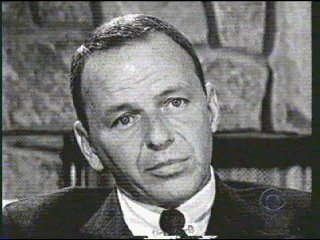
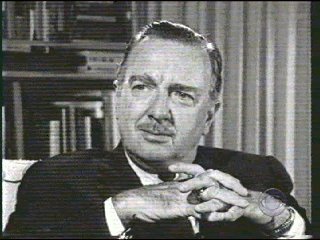 In November 1965, a CBS television film crew, including Walter Cronkite and Don Hewitt, spent six weeks with Sinatra. The footage was used in a program about the entertainer (called Sinatra), and was reused in May 1998, the week after he died, for a 48 Hours special called "Sinatra: Living With the Legend." I videotaped the 48 Hours special, hence this post.
In November 1965, a CBS television film crew, including Walter Cronkite and Don Hewitt, spent six weeks with Sinatra. The footage was used in a program about the entertainer (called Sinatra), and was reused in May 1998, the week after he died, for a 48 Hours special called "Sinatra: Living With the Legend." I videotaped the 48 Hours special, hence this post.A Don Hewitt site reveals what happened behind the scenes of this interview, after an agreement Sinatra's attorney had reached with Hewitt about not discussing certain things (primarily Mia Farrow) was broken:
The scene is Sinatra'’s Palm Springs house. Walter Cronkite has just asked the ominous question. According to Hewitt, Sinatra goes ballistic. He points to Hewitt.
SINATRA: Come inside, I want to talk to you. (They go into Sinatra'’s bedroom.) You broke all the rules.
HEWITT: No. Frank. We never agreed to those rules.
SINATRA: I ought to kill you.
HEWITT: With anyone else, that's a figure of speech. But you probably mean it.
SINATRA: I mean it.
HEWITT: If I have a choice, I'’d rather you didn'’t.
Whereupon Hewitt remembers he scurried out of Sinatra'’s house and back to his hotel. Sinatra never talked to him again. The broadcast may be the best ever done on Sinatra.
He never trusted the media, and you can see why.
It's an interesting interview, and it provides a good summation of his career from the time just after he left Tommy Dorsey's big band up to 1965 (which I will summarize; there may be a test):
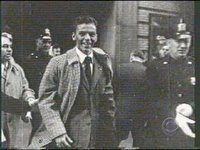

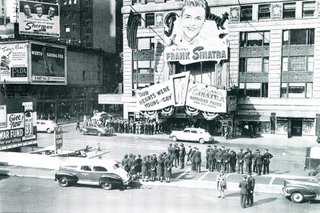
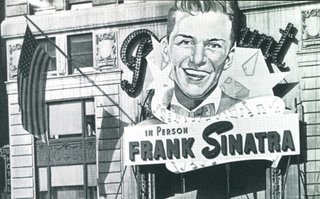
 A crowd of "bobby soxers" at a Sinatra, Paramount show in 1942. These girls would of course grow up, marry their high school sweethearts returning home from W.W. II, and lose interest in Sinatra.
A crowd of "bobby soxers" at a Sinatra, Paramount show in 1942. These girls would of course grow up, marry their high school sweethearts returning home from W.W. II, and lose interest in Sinatra.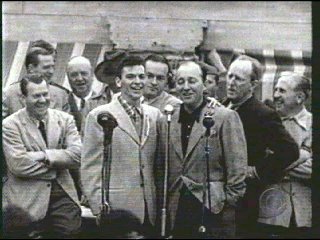 The Voice with his childhood idol, Der Bingle, at an U.S. Savings Bond rally, in 1943. They are singing a popular Sinatra song of the time (it peaked at #3), "People Will Say We're in Love."
The Voice with his childhood idol, Der Bingle, at an U.S. Savings Bond rally, in 1943. They are singing a popular Sinatra song of the time (it peaked at #3), "People Will Say We're in Love."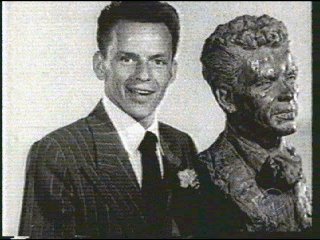
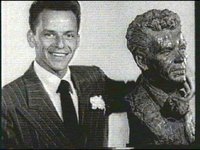
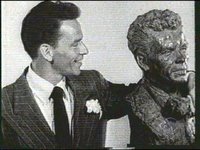
The Sultan of Swoon on top. Look at the hair! It wouldn't last either.
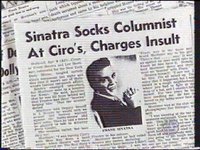

Lee Mortimer was what we would refer to today as a gossip columnist. He seemed to have a personal vendetta against Sinatra, and never missed an opportunity to disparage or insult Sinatra and his fans. Sinatra and Mortimer had a few run-ins. Sinatra, enraged at being referred to as a "“dago" and Mortimer attempting to tie him to the Mafia and the Communist Party, punched Mortimer in the nose in March 1947 at Ciro's. The Hearst papers (who employed Mortimer) promptly began attacking Sinatra full force.
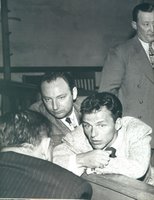

April 9, 1947 arraignment (Mortimer is on the right)
Anticipating a long jury trial, Louis B. Mayer (head of MGM film studios where Sinatra was a contract player), encouraged Sinatra to settle out of court with Mortimer, which he did ($9,000).
 But Sinatra got his revenge. In a broader sense, the singer's career survived Mortimer's smear campaign. But specifically, years after that, Frank, loaded, urinated on Mortimer's grave while reportedly saying "I'll bury the bastards. I'll bury them all." If you watch the video, I love the section where this incident is discussed:
But Sinatra got his revenge. In a broader sense, the singer's career survived Mortimer's smear campaign. But specifically, years after that, Frank, loaded, urinated on Mortimer's grave while reportedly saying "I'll bury the bastards. I'll bury them all." If you watch the video, I love the section where this incident is discussed:"The only time I had any physical contact with a newspaper man was with a man (Lee Mortimer) who is now dead (he spits out the word dead), who said some pretty nasty things about me in a column for about two years, and they were all gross lies. He once said something to me in person (at Ciro's); I reached the boiling point, and it was all over. Frankly, if he were alive and he said it to me again, I would do it again, because he was just that kind of a man."
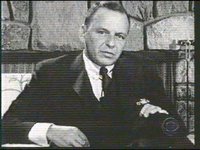
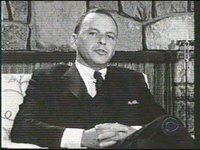

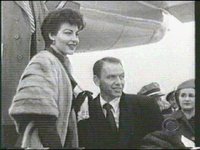
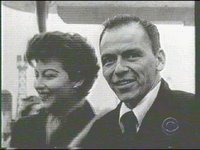
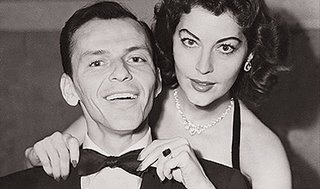 The public hated Sinatra for leaving Nancy and their three children (Nancy, Frank Jr., and Tina). It was really the final straw in terms of the public's patience with the crooner. Sinatra was reviled and despised, and his career, for all practical purposes, was OVER. Until...
The public hated Sinatra for leaving Nancy and their three children (Nancy, Frank Jr., and Tina). It was really the final straw in terms of the public's patience with the crooner. Sinatra was reviled and despised, and his career, for all practical purposes, was OVER. Until...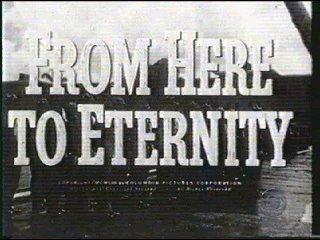 Ava was instrumental in convincing the powers-that-be behind From Here to Eternity to give Frank the part of Maggio.
Ava was instrumental in convincing the powers-that-be behind From Here to Eternity to give Frank the part of Maggio.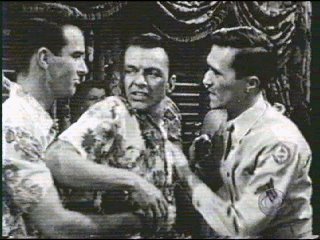
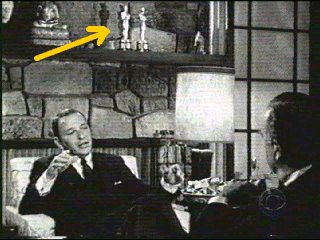 Sinatra won the 1953 Academy Award for Best Supporting Actor for his performance, and literally overnight, he was back.
Sinatra won the 1953 Academy Award for Best Supporting Actor for his performance, and literally overnight, he was back. This next screencap from the interview footage shows the singer arriving at the 1953 Oscar ceremonies, with daughter Nancy and son Frank. Here is a man who Sammy Davis Jr., a few years earlier, saw "slowly walking down Broadway with no hat (meaning to me he didn't care if people knew he'd lost his hair) and his collar up and not a soul...paying attention to him. This was the man who only a few years ago had tied up traffic all over Times Square." It is in that environment he arrived at the ceremonies, and just a few hours later, he would be well on his way to one of the greatest comebacks in entertainment history.

The camera lingers over a framed set of pictures, depicting Sinatra with JFK at an inaugural dinner:


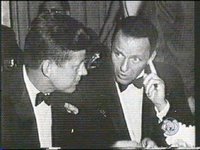
Here is the interview:
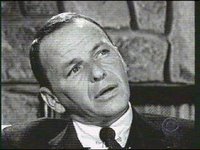


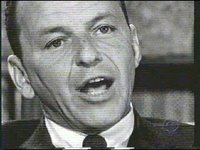
2 comments:
Thanks, Tracy. I appreciate it!
I've read some of Dominick Dunne's Vanity Fair articles, but I wasn't aware he'd crossed Sinatra's path. That must have been back when he was trying to make it in the movie business (?).
That's so cool(!), cj. I'm surprised you have any memory of being there, and with such detail.
Your Dad witnessed the famous Jack Entratter episode. Entratter was the general manager of The Sands. In the mid-60s, he cut off Sinatra's credit line. Sinatra wasn't too pleased, as you father witnessed. He did in fact crash a golf cart through a plate glass window. I believe Mia Farrow was along for that ride. If I'm not mistaken, Sinatra ended up being punched in the mouth, and losing a front tooth, leading to the famous Sinatra line "Never punch a Jew in the desert." Your parents must have been so cool (Cal Neva and The Sands!!). I'm awed.
Compliments like that keep this little endeavor going.
Post a Comment